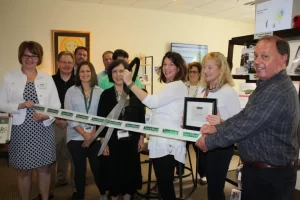
Do Not Settle For A Limited Selection Of Hearing Aids
Why Choosing the Right Hearing Aid Provider Matters ; And Why Hears Hearing & Hearables (HHH) Network is the Smart Choice Shopping for hearing aids
Aural (re)habilitation is training to help people make sense of the auditory world around them.
Aural (re)habilitation is training to help people make sense of the auditory world around them. This can type of training can be done in a number of ways that is catered to the person’s difficulties in communication. Some people are born with no hearing and are first trained with an introduction to sound on a very basic level. Other people have had hearing for a long time and lost it for a brief time before fitting with a hearing aid for auditory sensitivity. These people need less training or if trained at all, with more complex auditory stimuli, such as conversation in a noisy background. Training can and usually does include using all sensory modalities to make sense of the communication environment around.
Lots of children (and adults) have problems learning from and processing information they hear or see at home or at school. This may have nothing to do with the child’s ability to hear or see. Rather, the problem may be the result of the processing of that outside information through the appropriate channels to the brain. These auditory or cognitive processing deficiencies must be identified, diagnosed, and effectively treated.
Identifying and diagnosing cognitive problems may first occur when the child or the school notices some or all of the following: the child has a poor memory or what he read or was told, or his or her organizational abilities are poor, or the child has trouble concentrating or communicating, or he or she has trouble concentrating. Sometimes the problems are so noticeable that parents seek a diagnosis of “auditory processing” deficiency from the school or from a specialist. *(Central) auditory processing disorder [(C)APD] refers to difficulties in the processing of auditory information in the central nervous system (CNS) as demonstrated by poor performance in one or more of the following skills: sound localization and lateralization; auditory discrimination; auditory pattern recognition; temporal aspects of audition, including temporal integration, temporal discrimination (e.g., temporal gap detection), temporal ordering, and temporal masking; auditory performance in competing acoustic signals (including dichotic listening); and auditory performance with degraded acoustic signals. Non-modality-specific cognitive processing and language problems may manifest themselves in auditory tasks (i.e., as listening problems); however, diagnosis of (C)APD requires demonstration of a deficit in the neural processing of auditory stimuli that is not due to higher order language, cognitive, or related factors. This working group concluded after a comprehensive review of the literature that any definition of (C)APD that would require complete modality-specificity as a diagnostic criterion is neurophysiologically untenable; however, one should expect the sensory processing perceptual deficit in (C)APD to be more pronounced, in at least some individuals, when processing acoustic information. (C)APD is best viewed as a deficit in the neural processing of auditory stimuli that may coexist with but is not the result of, dysfunction in other modalities.
(C)APD can also lead to or be associated with difficulties in learning (e.g., spelling, reading), speech, language, attention, social, and related functions. Because of the complexity and heterogeneity of (C)APD, combined with the heterogeneity of learning and related disorders, it is to be expected that a simple, one-to-one correspondence between deficits in fundamental, discrete auditory processes and language, learning, and related sequelae may be difficult to demonstrate across large groups of diverse subjects. This underscores the need for comprehensive assessment and diagnostic procedures that fully explore the nature of the presenting difficulties of each individual suspected of having (C)APD. *Working group on Auditory processing disorders, ASHA.
An integrative listening approach – This includes movement, listening, and visual stimulation. The approach uses the combination of all these interactions to re-wire your nerves to make better connections. This is a very powerful type of therapy.
Ages 3 to senior – Because there are some more tasks other than listening children 3 and older are the best candidates for this therapy. It is a whole-body approach and although the listening component is beneficial alone the whole approach shows significantly more improvements. This therapy can be adapted for the older person too. It is good for all.
Management of sensory, attention, focus, and processing disability – It helps both with the processing of auditory stimuli and focuses. This can also help seniors who need to hone in on their own focus and strengthen their brains and nerves. Good for anyone who has some challenges. This is a great therapy for children with ADHD or Autism spectrum disorder (ASD).
Aural (re)habilitation is training to help people make sense of the auditory world around them. This can type of training can be done in a number of ways that is catered to the person’s difficulties in communication. Some people are born with no hearing and are first trained with an introduction to sound on a very basic level. Other people have had hearing for a long time and lost it for a brief time before fitting in with a hearing aid for auditory sensitivity. These people need less training or if trained at all, with more complex auditory stimuli, such as conversation in a noisy background. Training can and usually does include using all sensory modalities to make sense of the communication environment around. Please refer to ASHA website for a very thorough understanding of Aural (Re)habilitation. http://www.asha.org/public/hearing/Audiologic-Rehabilitation/
We offer independent Aural (re)habilitation through appointments. Some of the appointments may be covered under a service package. Other appointments for training and therapy are sold separately. Please refer to our transparency area for the costs of therapy.
Amptify has features that include support from a professional hearing health coach and peer community, auditory/cognitive training games, and an interactive curriculum. There are several modules within the curriculum that help you understand your type of hearing loss, discover effective listening tools and tricks, how to control your listening environment, minimize communication breakdowns, calm the mind, and maintain auditory brain skills. It will help you go past your diagnosis and your new technology to learn strategies to help you rehabilitate and strengthen your sense of hearing.

Why Choosing the Right Hearing Aid Provider Matters ; And Why Hears Hearing & Hearables (HHH) Network is the Smart Choice Shopping for hearing aids

Is there a difference between hearing aids? I [Jeffery B] recently had the opportunity to listen to a variety of hearing aids and to be
Powered By SinglerDesign.com